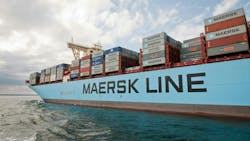Maersk to Change Safety Policies After OSHA Investigation
As part of a settlement with the U.S. Department of Labor, Maersk Line Limited will change its safety reporting policies and compensate a seaman the company terminated after they reported safety concerns to the U.S. Coast Guard without first notifying their employer.
Headquartered in Norfolk, Maersk Line Limited operates the largest U.S. flag fleet in commercial service and employs about 700 U.S. mariners. The company is the largest subsidiary of A.P. Moeller-Maersk.
The actions follow a three-day hearing in June 2024 where Maersk challenged the findings of a whistleblower investigation by OSHA found the company violated the employee’s rights under the federal Seaman’s Protection Act by retaliating against the seaman.
OSHA found the company policy, which forbids employees from contacting the USCG or other federal, state or local regulatory agencies without first notifying the company, violated federal law. Workers have the right to report safety concerns directly to authorities without fear of retaliation.
The investigation began after the seaman alerted the U.S. Coast Guard about safety concerns aboard the Safmarine Mafadi, a 50,000-ton, 958-foot container ship, in December 2020. They included lifeboat equipment in need of repair and replacement, crew members onboard in possession of, and possibly consuming alcohol, improper supervision of cadet seamen, and a bilge system not preventing cargo holds from flooding.
“The Department of Labor will enforce workers’ protected rights as whistleblowers under federal law,” said Solicitor of Labor Seema Nanda, in a statement. “No employer may violate whistleblower regulations or create policies that require employees to notify their employer before they report concerns to federal regulatory agencies. This seaman showed the kind of bravery for which mariners have long been known by raising concerns that, left unchecked, could have endangered everyone aboard the Safmarine Mafadi.”
In a settlement reached after the hearing in Boston, Maersk agreed to make the following changes:
- Remove any requirement that workers notify the company before contacting the U.S. Coast Guard.
- Refrain from retaliation against seamen who contact the USCG.
- Provide all supervisors with training on the revised policy.
- Distribute OSHA’s Seaman’s Protection Act Fact Sheet to seamen aboard its U.S. flagged vessels for the next two years.
“This case is an important affirmation that all mariners have the option to contact the U.S. Coast Guard directly for addressing a safety concern,” said Rear Admiral and Assistant Commandant for Prevention Policy for the U.S. Coast Guard Wayne Arguin, in a statement. “Safety requires a team approach. The size, complexity and importance of the marine transportation system demand that everyone work together to prevent casualties and minimize supply chain disruptions.”
Maersk also agreed to future compliance with all applicable regulations and to compensate the terminated seaman for lost wages and damages. Under the terms of the settlement, Maersk did not admit to violations of the Seaman’s Protection Act.
“This resolution is a victory for mariners aboard U.S.-flagged vessels worldwide,” said Assistant Secretary for Occupational Safety and Health Douglas L. Parker, in a statement. “Workers who cope with the ocean’s natural hazards should never fear reporting concerns about their vessel’s safety. Maritime industry workers are vital to the well-being of our nation, and there is no place for policies that restrict their rights to alert authorities to unsafe conditions.”
